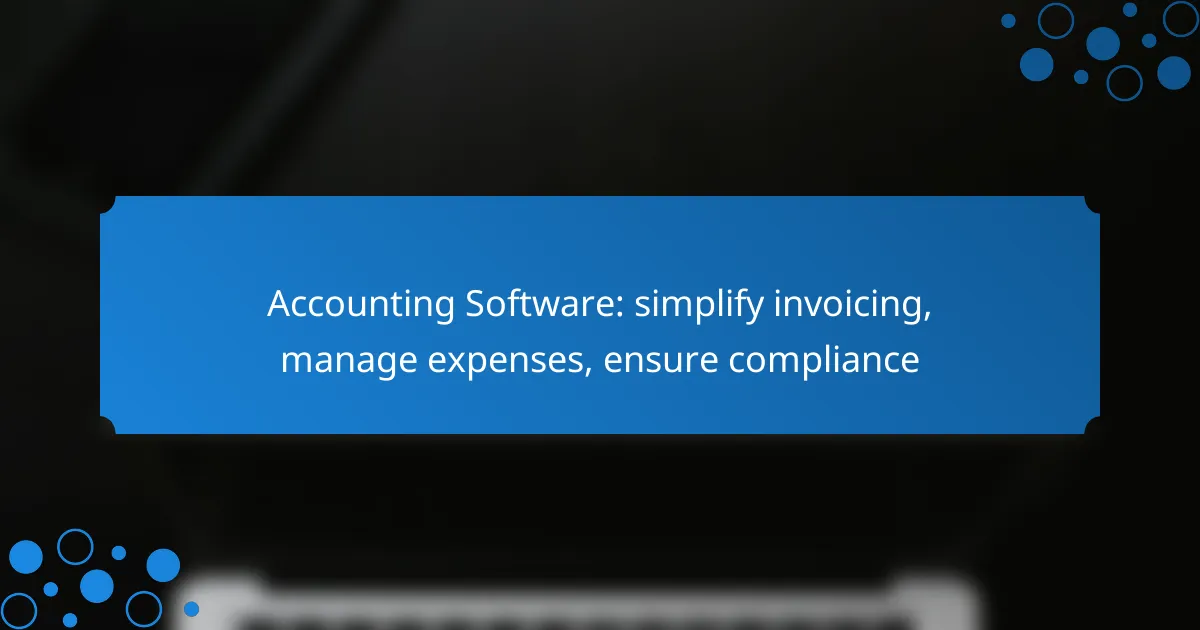Accounting software is essential for businesses looking to streamline their financial processes. By automating invoicing and expense management, these tools reduce manual errors and save time, allowing companies to focus on growth. Additionally, they help ensure compliance with local regulations, providing peace of mind and financial oversight.

What are the best accounting software solutions in Australia?
The best accounting software solutions in Australia include Xero, MYOB, QuickBooks Online, FreshBooks, and Zoho Books. These platforms simplify invoicing, manage expenses, and ensure compliance with local regulations, catering to various business needs.
Xero
Xero is a popular cloud-based accounting software designed for small to medium-sized businesses in Australia. It offers features like invoicing, expense tracking, and bank reconciliation, making it easy to manage finances from anywhere.
One of Xero’s strengths is its user-friendly interface, which allows users to navigate the software with ease. Additionally, it integrates with numerous third-party applications, enhancing its functionality and adaptability for various business models.
MYOB
MYOB is a well-established accounting solution in Australia, particularly favored by small businesses. It provides comprehensive features such as payroll management, invoicing, and tax compliance, ensuring users meet local regulatory requirements.
MYOB offers both cloud-based and desktop versions, allowing businesses to choose the option that best suits their needs. Its strong customer support and training resources make it a reliable choice for those new to accounting software.
QuickBooks Online
QuickBooks Online is a versatile accounting software that caters to businesses of all sizes in Australia. It features robust invoicing, expense tracking, and reporting capabilities, making it suitable for diverse financial management needs.
Its mobile app allows users to manage finances on the go, and it offers various pricing tiers, enabling businesses to select a plan that fits their budget. QuickBooks Online also integrates with many other applications, enhancing its utility.
FreshBooks
FreshBooks is an intuitive accounting software primarily aimed at freelancers and small businesses. It simplifies invoicing and expense tracking, allowing users to focus on their core business activities without getting bogged down by financial management.
With features like time tracking and project management, FreshBooks is ideal for service-based businesses. Its straightforward pricing model and excellent customer support make it an attractive option for those seeking ease of use.
Zoho Books
Zoho Books is a comprehensive accounting solution that offers a wide range of features, including invoicing, expense tracking, and tax compliance. It is particularly beneficial for small to medium-sized businesses looking for an affordable yet powerful tool.
Zoho Books integrates seamlessly with other Zoho applications, providing a complete suite for business management. Its automation features help reduce manual tasks, allowing users to save time and improve efficiency.
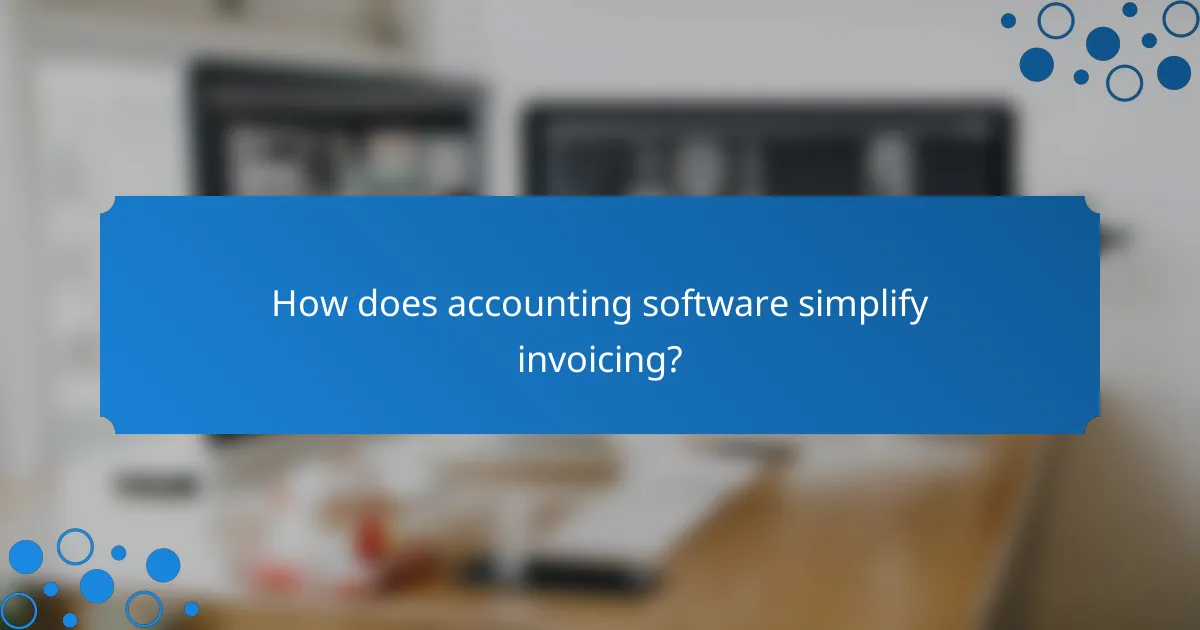
How does accounting software simplify invoicing?
Accounting software simplifies invoicing by automating the creation and management of invoices, reducing manual effort and errors. This allows businesses to focus on their core operations while ensuring timely payments and better cash flow management.
Automated invoice generation
Automated invoice generation allows businesses to create invoices quickly and efficiently without manual input. Users can set up templates that automatically populate with client details, services rendered, and payment terms, which saves time and minimizes errors.
This feature is particularly beneficial for businesses with high transaction volumes, as it can significantly reduce the time spent on administrative tasks. Many accounting software options can generate invoices in just a few clicks, often within minutes.
Customizable templates
Customizable templates enable businesses to create invoices that reflect their brand identity. Users can modify colors, logos, and layouts to ensure that invoices are professional and consistent with their branding.
Having a personalized invoice template can enhance customer perception and improve the likelihood of prompt payment. Most accounting software provides a variety of pre-designed templates that can be easily tailored to meet specific needs.
Recurring billing features
Recurring billing features allow businesses to automate the invoicing process for ongoing services or subscriptions. This means that invoices can be scheduled to be sent out at regular intervals, such as weekly, monthly, or annually, without manual intervention.
This functionality is ideal for businesses that offer subscription-based services, as it ensures consistent cash flow and reduces the risk of missed payments. Users can set parameters for billing cycles and amounts, making it easy to manage long-term client relationships.
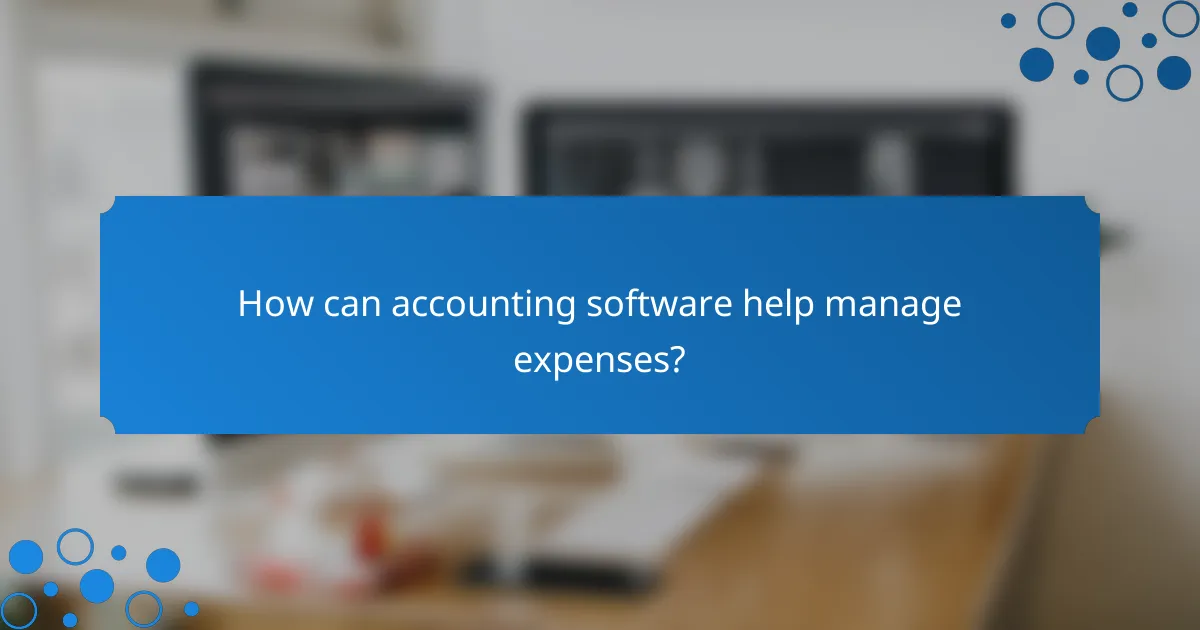
How can accounting software help manage expenses?
Accounting software simplifies expense management by providing tools for tracking, categorizing, and analyzing expenditures. This enables businesses to maintain financial oversight, optimize budgets, and ensure compliance with relevant regulations.
Expense tracking tools
Expense tracking tools within accounting software allow users to log and categorize expenses easily. These tools often include features like automated entry, which reduces manual input and minimizes errors. Users can set budgets and receive alerts when nearing limits, helping to control spending effectively.
Many software options offer customizable categories, enabling businesses to tailor tracking to their specific needs. For instance, a small business might categorize expenses into marketing, operations, and payroll, facilitating better financial analysis.
Integration with bank accounts
Integrating accounting software with bank accounts streamlines expense management by automatically importing transactions. This feature reduces the need for manual entry and helps ensure that all expenses are accounted for in real-time. Users can reconcile bank statements quickly, enhancing accuracy in financial reporting.
When selecting accounting software, consider options that support multiple bank integrations, especially if your business uses various accounts. This flexibility can simplify tracking across different financial sources, making it easier to maintain a comprehensive view of expenses.
Receipt scanning capabilities
Receipt scanning capabilities allow users to digitize and store receipts directly within the accounting software. This feature eliminates the clutter of physical receipts and ensures that important documentation is easily accessible for audits or tax purposes. Many solutions utilize optical character recognition (OCR) to extract data from receipts automatically.
When using receipt scanning, ensure that the software supports various formats and can handle different currencies, especially if your business operates internationally. Regularly review scanned receipts to confirm accuracy and completeness, as discrepancies can lead to compliance issues during tax season.
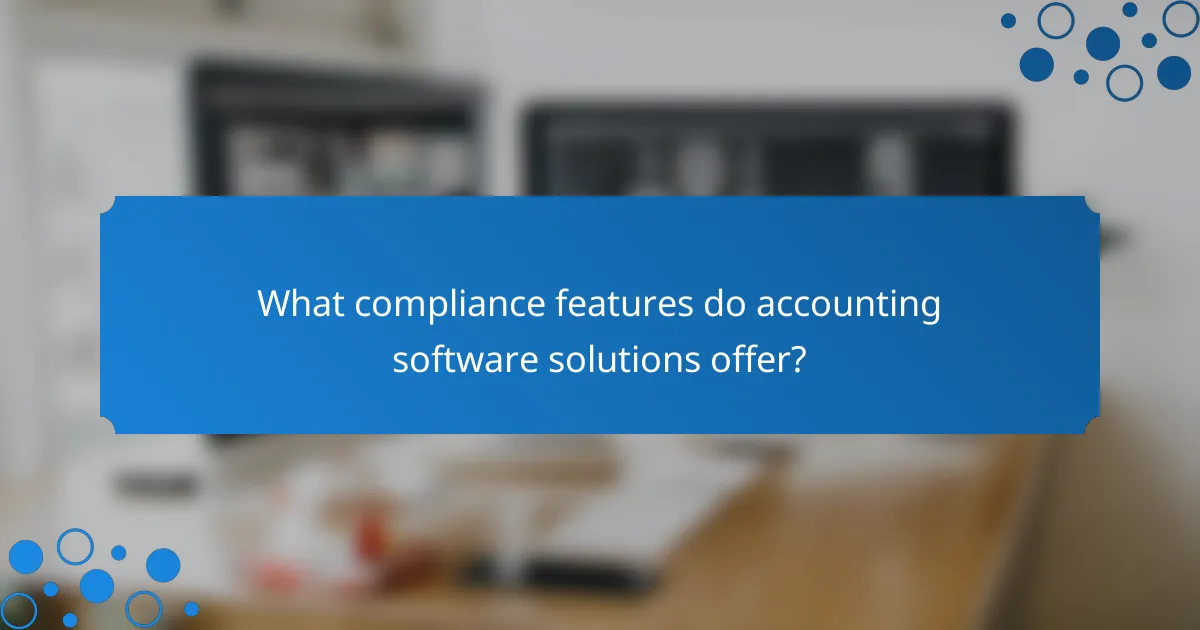
What compliance features do accounting software solutions offer?
Accounting software solutions typically offer a range of compliance features designed to help businesses adhere to financial regulations and standards. These tools streamline processes like tax reporting, ensure accurate record-keeping, and facilitate audits, which can significantly reduce the risk of non-compliance.
GST compliance tools
GST compliance tools within accounting software help businesses manage Goods and Services Tax obligations effectively. These tools automate the calculation of GST on sales and purchases, ensuring accurate tax reporting and timely submissions to tax authorities.
Many solutions also provide features for generating GST-compliant invoices and maintaining detailed records of transactions. This can simplify audits and reduce the likelihood of penalties due to errors or omissions.
Tax reporting features
Tax reporting features in accounting software enable businesses to prepare and file tax returns efficiently. These features often include automated calculations for various tax types, such as income tax and VAT, tailored to local regulations.
Users can typically generate reports that summarize taxable income, deductions, and credits, making it easier to understand tax liabilities. Some software even offers e-filing options, allowing businesses to submit their returns directly to tax authorities.
Audit trail capabilities
Audit trail capabilities are essential for maintaining transparency and accountability in financial transactions. Accounting software with robust audit trails tracks changes made to financial records, including who made the changes and when.
This feature is crucial for compliance, as it provides a clear history of transactions and adjustments, making it easier to identify discrepancies. Businesses should ensure their chosen software offers detailed audit trails to facilitate internal reviews and external audits.
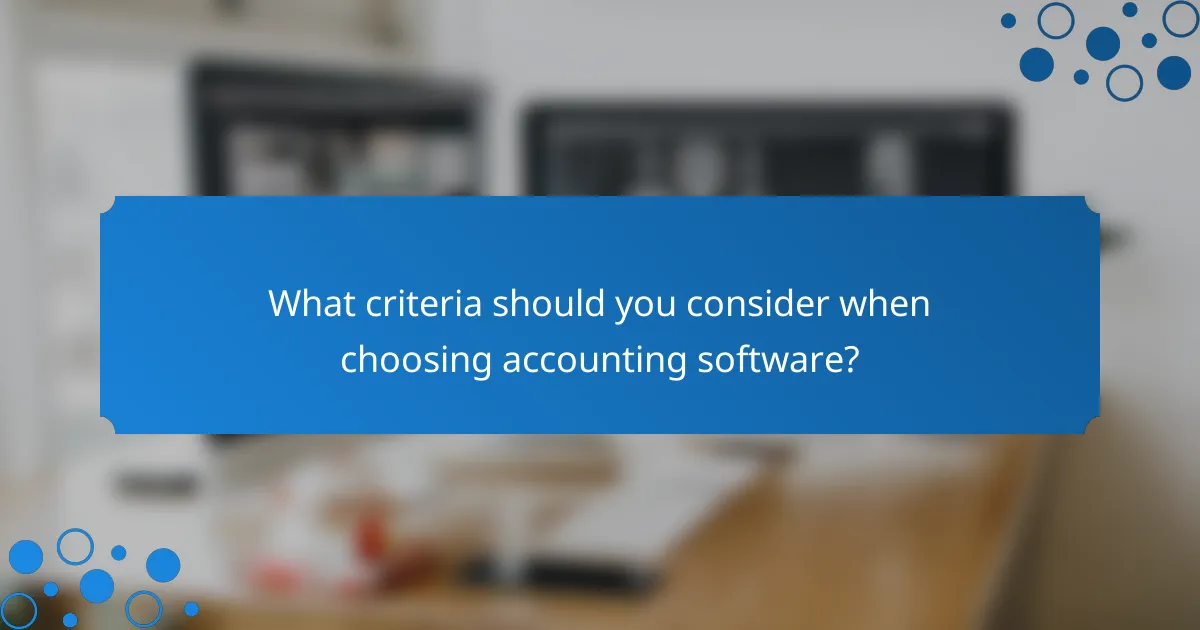
What criteria should you consider when choosing accounting software?
When selecting accounting software, consider factors like ease of use, features, cost, and compliance with local regulations. These criteria will help ensure the software meets your business needs and simplifies tasks such as invoicing and expense management.
Ease of use
Choose accounting software that is intuitive and user-friendly. A straightforward interface minimizes the learning curve, allowing you to focus on managing finances rather than navigating complex features. Look for software that offers tutorials or customer support to assist with onboarding.
Features
Evaluate the specific features that the accounting software offers, such as invoicing, expense tracking, and tax compliance. Ensure that it integrates well with other tools you use, like payment processors or inventory management systems. Prioritize features that align with your business model and operational requirements.
Cost
Assess the pricing structure of the accounting software, including subscription fees, transaction costs, and any additional charges for premium features. Many software options offer tiered pricing, so consider your budget and the scale of your operations. Look for software that provides a good balance between cost and functionality.
Compliance
Ensure the accounting software complies with local regulations and accounting standards. This is particularly important for businesses operating in countries with strict tax laws. Software that automates compliance tasks can help reduce the risk of errors and penalties, making it a valuable investment.
